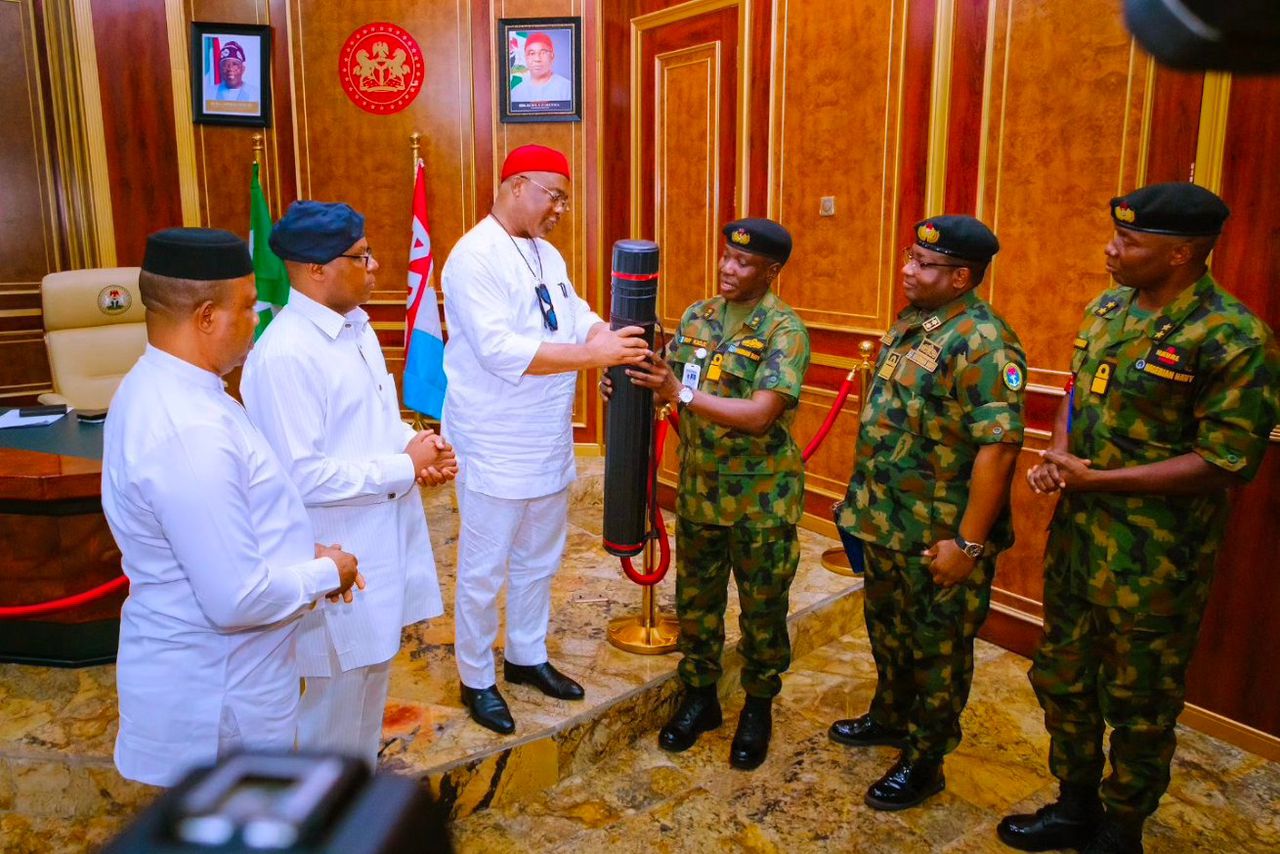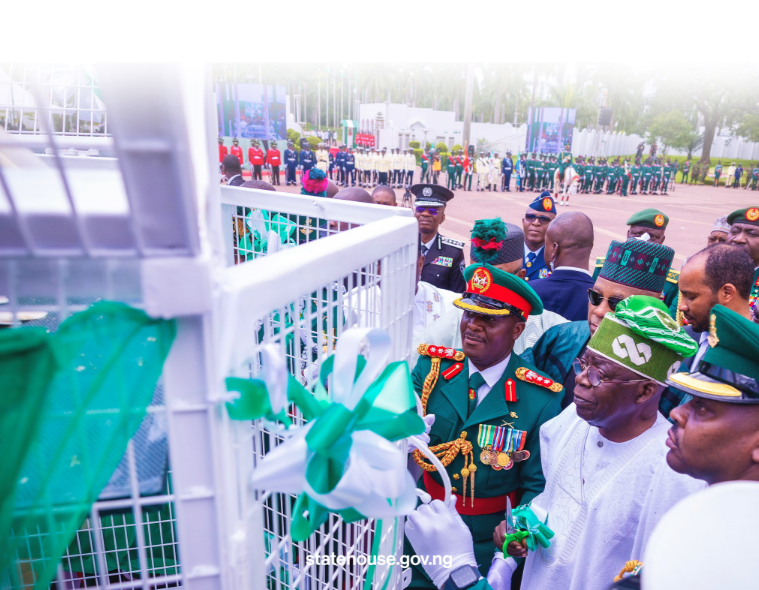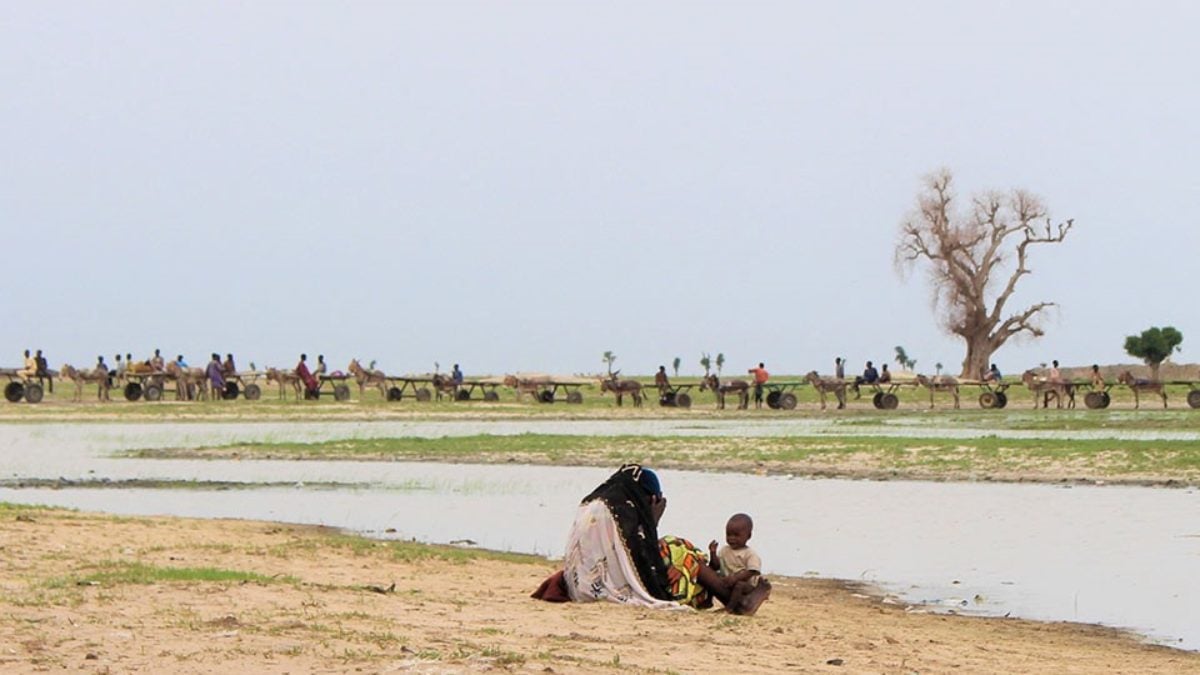BY BABAJIDE VICTOR
Heartwarming news emerged this week that the Nigerian Navy has completed work on the pre-dredging survey aimed at creating a sea access route for Imo state, from Oguta Lake through Orashi River, to the Atlantic Ocean; and subsequently produced a comprehensive report of the survey project. (Full technical name: Report of the Pre-Dredging Survey and Charting for Oguta Lake & Orashi River Development and Sea Access Project: From Oguta Lake to the Atlantic Ocean).
The report was presented to the governor of Imo state, Hope Uzodimma, on Monday, September 25, 2023, by a naval delegation led by the group managing director, Navy Holdings Limited, Rear Admiral Hassan Kaoje, and the hydrographer of the Nigerian Navy, Rear Admiral Ayo Olugbode.
It is a project that in my view has been generally under-reported and under-covered. And also, very importantly, a project that speaks to multiple things; the vision of the Imo state governor, Hope Uzodimma, the unflinching support that the immediate-past administration gave to subnational governments— a stance which President Bola Ahmed Tinubu (GCFR) is fully committed to maintaining, the hard work of the immediate-past chief of the naval staff under whose watch the survey project kicked off and, very importantly, the commitment of President Tinubu and chief of naval staff Vice Admiral Emmanuel Ogalla to deepening and building on the legacies of their predecessors.
Advertisement
Even with the transitions that have happened at the presidential leveland at the level of service chiefs, this important project has not been ignored or allowed to suffer. This is indeed very commendable.
When the project was first announced and an MOU signed between Imo state government and the Nigerian Navy on December 8, 2022, naysayer voices were quite loud. Indeed, the governor alluded to this at the ceremony on Monday but the promoters and collaborators have refused to be deterred. Now that this first phase has been completed, the stage is now set for phase 2, which according to the governor, will include an “environmental impact assessment (EIA) and other necessary arrangements that will lead into the dredging proper”.
This is a truly transformational project, which I hope will be pursued to its very completion. I think a background or summary would be necessary at this point, to explain what the project is all about. It is about opening up a viable maritime route between Oguta Lake in Imo state and the Atlantic Ocean. For those who are familiar with the geography of the region, the south-east region of Nigeria is landlocked, meaning that there is no part of it directly bordering the Atlantic Ocean and that to access the ocean, you need to cross the territory of the south-south. But being landlocked in this way should ideally not be seen as a setback, especially when there are inland river connections that link to the ocean. This route from Oguta Lake to the ocean is one of such routes.
Centuries ago, during colonial times, this route was a functioning one. Sadly, over time it stopped functioning, hence the need to chart and dredge it so as to make it navigable on a commercial basis. I am very excited by the role that the Nigerian Navy is playing in this regard. Everyone knows what the Navy does as one of the services of the Nigerian Armed Forces. Nobody needs any introduction or explainer on that. But as we all know, the work of security and securing Nigeria should go well beyond direct law enforcement.
Advertisement
Law enforcement is only one aspect of the entire security architecture. Anything that contributes to economic prosperity, to job creation and to investment, is ultimately contributing to security, knowing the nexus between economic and security matters.
Nigeria’s teeming population need jobs, well-paying ones at that. A lot of the crime and criminality issues that we are dealing with can be linked directly to the unemployment situation in the country and all hands therefore need to be on deck to tackle these economic issues with a whole-of-society approach.
It is for this reason that the Nigerian Navy’s active participation and partnership in this economic transformation project, i.e., dredging the Oguta Lake — Atlantic Ocean route is very much welcome and commendable.
It is instructive to note that the new chief of the naval staff, Vice Admiral Emmanuel Ogalla, spent quite a bit of his career at the Nigerian Navy Hydrographic Office (NNHO) where he rose to become a deputy director and the Nigerian Navy Hydrographic School (NNHS), where he was chief instructor and then commandant between 2014 and 2016. Early in his career, he attended hydrography training at India’s National Hydrographic School.
Advertisement
So, if there is someone who understands the importance of hydrographic surveys and the very vital role that the Nigerian Navy can play in this area, supporting the economic transformation agenda of the President, it is Vice Admiral Ogalla. And he is presiding over a Nigerian Navy that has invested a lot to build its hydrographic capabilities, especially in recent years. In May 2021, the Nigerian Navy took delivery of NNS LANA, a brand-new ship that is its first-ever purpose-built hydrographic survey vessel, and which replaced the one decommissioned a decade earlier. That same year, NNS LANA won Baird Maritime’s ‘Best Large Research Vessel’ Award.
In March 2022, the then honorable minister of transportation flagged off the Indigenous Survey and Charting of Nigeria’s Offshore Waters by NNS LANA, cementing a departure from previous exclusive dependence on foreign partners and foreign assistance for charting Nigeria offshore waters.
It should be pointed out that the Oguta Lake—Atlantic Ocean project is not the only one that the Nigerian Navy is playing a leading role in, using its newfound capabilities and expertise. There is also another project, The Regional Sealink Project, being carried out in partnership with the National Inland Waterways Authority (NIWA), NEXIM Bank, and the Sealink Consortium, supported by a grant from AfreximBank, to produce indigenous navigational charts of the Lower River Niger, covering 456km from Lokoja all the way to Burutu.
According to the promoters: “The Regional Sealink Project is a trade facilitation initiative designed to bridge critical logistics infrastructure gap toward facilitating and deepening inland and intra-coastal waterways operations”. The ultimate goal is to facilitate greater intra-African trade, especially through maritime channels.
Advertisement
Already, as of March 2023, the first set of charts from this endeavour had been completed and formally launched. And we should expect more output in the months and years ahead, under the leadership of Vice Admiral Ogalla.
This direct involvement of the Nigerian Navy to the economic growth and development of Nigeria, deploying its technical capabilities to projects of monumental economic value is very much welcome, and is a worthy model for all law enforcement agencies in Nigeria to follow considering that they all possess skills and capabilities that extend beyond direct application of their law enforcement mandate and powers.
Advertisement
When the story of the renaissance of maritime trade and investment in Nigeria is being told, there is no doubt that the Nigerian Navy will feature prominently as an enthusiastic and capable partner and enabler.
Advertisement
Views expressed by contributors are strictly personal and not of TheCable.
Add a comment






